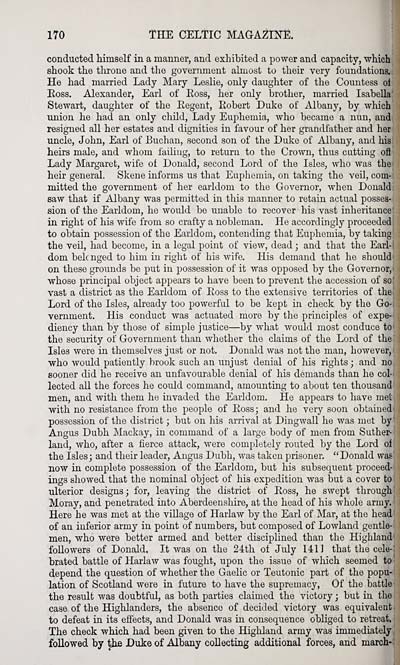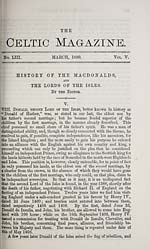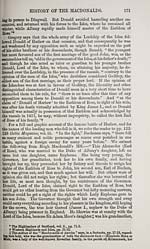Blair Collection > Celtic magazine > Volume 5
(180)
Download files
Complete book:
Individual page:
Thumbnail gallery: Grid view | List view

170 THE CELTIC MAGAZINE.
conducted himself in a manner, and exhibited a power and capacity, which! (
shook the tlirone and tlie governjnent almost to their very foundations., i
He had married Lady Mary Leslie, only daughter of the Countess ol' i
Eoss. Alexander, Earl of Eoss, her only brother, married Isabella! .^
Stewart, daughter of the Eegent, Eobert Duke of Albany, by which i
union he had an only child. Lady Euphemia, who became a nun, andi i
resigned all her estates and dignities in favour of her grandfather and hen I
uncle, John, Earl of Buchan, second son of the Duke of Albany, and hial i!
heirs male, and whom failing, to return to the Crown, thus cutting ofi'
Lady Margaret, wife of Donald, second Lord of the Isles, who was the I f
heir general. Skene informs us that Euphemia, on taking the veil, com-i n
mitted the government of her earldom to the Governor, when Donald! ■:
saw that if Albany was permitted in this manner to retain actual posses-' =
sion of the Earldom, he would be unable to recover his vast inheritance! \
in right of his wife from so crafty a nobleman. He accordingly proceeded! i
to obtain possession of the Earldom, contending that Euphemia, by taking! l
the veil, had become, in a legal point of view, dead ; and that the Earl-j i
dom beknged to him in right of his wife. His demand that he should; s
on these grounds be put in possession of it was opposed by the Governor,! i
whose principal object appears to have been to prevent the accession of sol '■
vast a district as tlie Earldom of Eoss to the extensive territories of the! J
Lord of the Isles, already too powerful to be kept in check by the Go-i'
vemment. His conduct was actuated more by the principles of expe-! j
diency than by those of simple justice — by what would most conduce toi i
the security of Government than whether the claims of the Lord of thej 1
Isles were in themselves just or not. Donald was not the man, however,! i
who would patiently brook such an unjust denial of his rights ; and no;
sooner did he receive an unfavourable denial of his demands than he col-i ;
lected aU the forces he could command, amounting to about ten thousand i i
men, and with them he invaded the Earldom. He appears to have met , |
with no resistance from the people of Eoss; and he very soon obtained! (
possession of the district ; but on his arrival at Dingwall he was met byi '■
Angus Dubh Mackay, in command of a large body of men from Suther-i i
land, who, after a fierce attack, were completely routed by the Lord ofi
the Isles; and their leader, Angus Dubh, was taken prisoner. "Donald was' l
now in complete possession of the Earldom, but his subsequent proceed- j «
ings showed that the nominal object of his expedition was but a cover to! '
ulterior designs ; for, leaving the district of Eoss, he swept through} i
Moray, and penetrated into Aberdeenshire, at the head of his whole army. ! i
Here he was met at the village of Harlaw by the Earl of Mar, at the headi :|
of an inferior army in point of numbers, but composed of Lowland gentle- 1 I
men, who were better armed and better disciplined than the Highland' i
followers of Donald, It was on the 24th of July 1411 that the cele-H
brated battle of Harlaw was fought, upon the issue of which seemed toj
depend the question of whether the Gaelic or Teutonic part of the popu-' {
lation of Scotland were in future to have the supremacy, Of the battle* \
the result was doubtful, as both parties claimed the victory ; but in the { (
case of the Highlanders, the absence of decided victory was equivalent! i
to defeat in its effects, and Donald was in consequence obliged to retreat. | i
The check which had been given to the Highland army was immediately \ >
followed by the Duke of Albany collecting additional forces, and march-' /
conducted himself in a manner, and exhibited a power and capacity, which! (
shook the tlirone and tlie governjnent almost to their very foundations., i
He had married Lady Mary Leslie, only daughter of the Countess ol' i
Eoss. Alexander, Earl of Eoss, her only brother, married Isabella! .^
Stewart, daughter of the Eegent, Eobert Duke of Albany, by which i
union he had an only child. Lady Euphemia, who became a nun, andi i
resigned all her estates and dignities in favour of her grandfather and hen I
uncle, John, Earl of Buchan, second son of the Duke of Albany, and hial i!
heirs male, and whom failing, to return to the Crown, thus cutting ofi'
Lady Margaret, wife of Donald, second Lord of the Isles, who was the I f
heir general. Skene informs us that Euphemia, on taking the veil, com-i n
mitted the government of her earldom to the Governor, when Donald! ■:
saw that if Albany was permitted in this manner to retain actual posses-' =
sion of the Earldom, he would be unable to recover his vast inheritance! \
in right of his wife from so crafty a nobleman. He accordingly proceeded! i
to obtain possession of the Earldom, contending that Euphemia, by taking! l
the veil, had become, in a legal point of view, dead ; and that the Earl-j i
dom beknged to him in right of his wife. His demand that he should; s
on these grounds be put in possession of it was opposed by the Governor,! i
whose principal object appears to have been to prevent the accession of sol '■
vast a district as tlie Earldom of Eoss to the extensive territories of the! J
Lord of the Isles, already too powerful to be kept in check by the Go-i'
vemment. His conduct was actuated more by the principles of expe-! j
diency than by those of simple justice — by what would most conduce toi i
the security of Government than whether the claims of the Lord of thej 1
Isles were in themselves just or not. Donald was not the man, however,! i
who would patiently brook such an unjust denial of his rights ; and no;
sooner did he receive an unfavourable denial of his demands than he col-i ;
lected aU the forces he could command, amounting to about ten thousand i i
men, and with them he invaded the Earldom. He appears to have met , |
with no resistance from the people of Eoss; and he very soon obtained! (
possession of the district ; but on his arrival at Dingwall he was met byi '■
Angus Dubh Mackay, in command of a large body of men from Suther-i i
land, who, after a fierce attack, were completely routed by the Lord ofi
the Isles; and their leader, Angus Dubh, was taken prisoner. "Donald was' l
now in complete possession of the Earldom, but his subsequent proceed- j «
ings showed that the nominal object of his expedition was but a cover to! '
ulterior designs ; for, leaving the district of Eoss, he swept through} i
Moray, and penetrated into Aberdeenshire, at the head of his whole army. ! i
Here he was met at the village of Harlaw by the Earl of Mar, at the headi :|
of an inferior army in point of numbers, but composed of Lowland gentle- 1 I
men, who were better armed and better disciplined than the Highland' i
followers of Donald, It was on the 24th of July 1411 that the cele-H
brated battle of Harlaw was fought, upon the issue of which seemed toj
depend the question of whether the Gaelic or Teutonic part of the popu-' {
lation of Scotland were in future to have the supremacy, Of the battle* \
the result was doubtful, as both parties claimed the victory ; but in the { (
case of the Highlanders, the absence of decided victory was equivalent! i
to defeat in its effects, and Donald was in consequence obliged to retreat. | i
The check which had been given to the Highland army was immediately \ >
followed by the Duke of Albany collecting additional forces, and march-' /
Set display mode to: Large image | Transcription
Images and transcriptions on this page, including medium image downloads, may be used under the Creative Commons Attribution 4.0 International Licence unless otherwise stated. ![]()
| Early Gaelic Book Collections > Blair Collection > Celtic magazine > Volume 5 > (180) |
|---|
| Permanent URL | https://digital.nls.uk/76451032 |
|---|
| Description | Volume V, 1880. |
|---|---|
| Shelfmark | Blair.6 |
| Attribution and copyright: |
|
| Description | A selection of books from a collection of more than 500 titles, mostly on religious and literary topics. Also includes some material dealing with other Celtic languages and societies. Collection created towards the end of the 19th century by Lady Evelyn Stewart Murray. |
|---|
| Description | Selected items from five 'Special and Named Printed Collections'. Includes books in Gaelic and other Celtic languages, works about the Gaels, their languages, literature, culture and history. |
|---|

